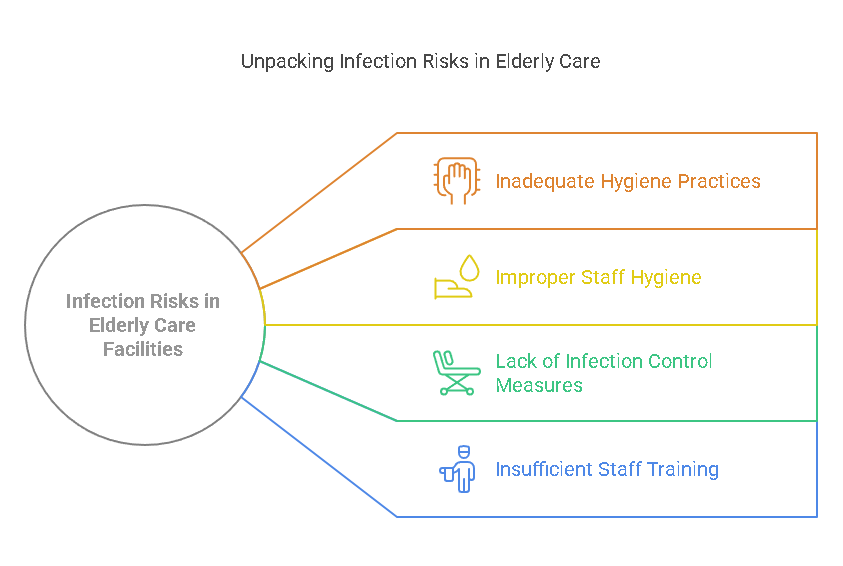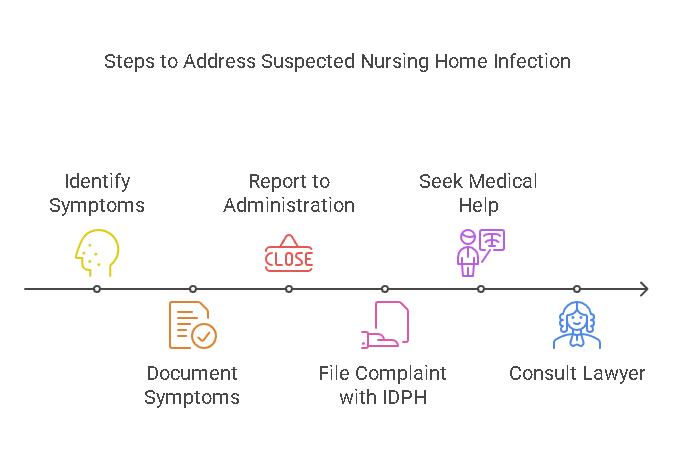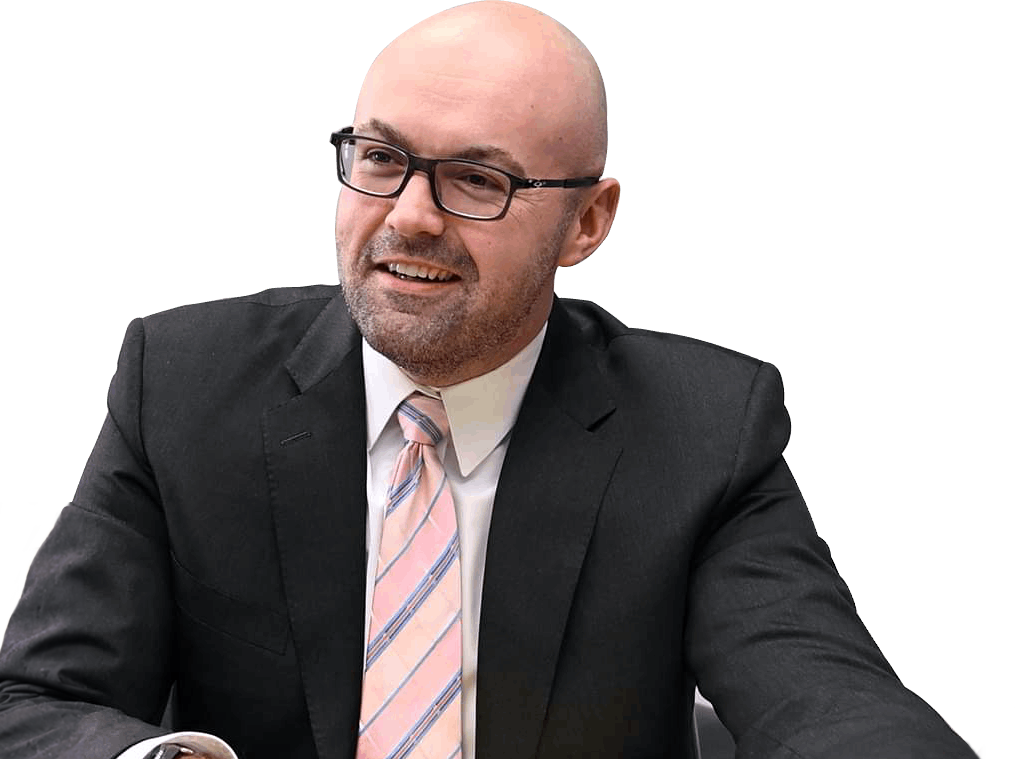Our personal injury lawyers understand the pain and frustration that come when a loved one suffers from an infection due to negligence in a nursing home. Infections can lead to severe health complications, prolonged illness, and even wrongful death.
If your family member has been affected, our dedicated team is here to ensure they receive the compensation for the suffering they have endured.
How Our Chicago Nursing Home Infections Attorney Can Help
Navigating the aftermath of a nursing home infection can be overwhelming. At Chicago Injury Lawyer, our attorneys are here to provide legal support and guidance to ensure justice. Here’s how we can assist:
- Assessing Your Case: We review your situation comprehensively, analyse medical records, and evaluate the nursing home’s adherence to health regulations.
- Gathering Evidence: Our dedicated team diligently collects crucial evidence, such as medical records, staff logs, and documentation of hygiene practices, which form the backbone of your legal claim.
- Expert Testimony: We collaborate with leading medical experts to substantiate how the infection directly resulted from negligence and how it could have been averted, strengthening your case.
- Aggressive Advocacy: Known for our vigorous advocacy, we don’t just aim to participate in legal battles; we aim to win them. Whether in court or through settlement negotiations, our focus is to secure the maximum compensation for our clients.
If your loved one has suffered from an infection in a nursing home, don’t let their suffering be in vain. Contact our nursing home infections lawyer in Chicago to schedule a consultation, and let us help.
Breaking Down the Types of Infections in Nursing Homes
Nursing home infections can have a severe impact on the health of elderly residents, particularly those with weakened immune systems. Bacteria, viruses, or fungi cause these infections and can lead to severe, sometimes life-threatening conditions. Here are some of the most common types of infections found in nursing homes:
- Urinary Tract Infections (UTIs):
- Symptoms: Include urgency, discomfort, and pain during urination; sometimes fever or lower back pain.
- Risks: This is particularly common among residents who require catheters.
- Respiratory Infections:
- Symptoms: They can range from mild to severe, including chest pain, fever, and difficulty breathing.
- Risks: Highly contagious and can spread quickly in close living quarters.
- Skin Infections (Including Bedsores):
- Symptoms: Redness, swelling, and pain at the infection site; in severe cases, open wounds or ulcers.
- Risks: Bedsores are particularly dangerous as they can lead to serious infections if not promptly treated.
- Gastrointestinal Infections:
- Symptoms: Include nausea, vomiting, diarrhoea, and abdominal pain.
- Risks: These infections can cause dehydration and more severe complications, especially in vulnerable residents.
- Influenza and Pneumonia:
- Symptoms: Fever, chills, cough, and body aches are common symptoms of influenza. Pneumonia symptoms include these, plus difficulty breathing and chest pain.
- Risks: Both can be deadly for elderly individuals and those with pre-existing health conditions.
Key Factors Leading to Infections in Elderly Care Facilities
Infections in nursing homes can occur due to multiple factors that compromise the sanitary conditions and care standards necessary to protect residents. Key contributors include:
Inadequate Hygiene Practices
- Failure to regularly clean and disinfect surfaces, linens, and resident care equipment.
- Inadequate hygiene allows pathogens to thrive and spread among residents and staff.
Improper Staff Hygiene
- Staff are failing to wash their hands regularly, especially after contact with bodily fluids or when handling waste.
- One of the primary ways infections spread in healthcare settings.
Lack of Infection Control Measures
- Protocols to manage outbreaks, such as isolation procedures or prompt medical treatment for infected individuals, are absent.
- Without strict controls, a single case of infection can lead to an outbreak affecting many residents.
Insufficient Staff Training
- Staff are not adequately trained on infection prevention techniques and the importance of personal protective equipment.
- The risk of infection spread increases due to ignorance or neglect of basic sanitation practices.
Understanding the risks and development of infections highlights the importance of stringent care practices and effective infection control in nursing homes. Awareness of these issues enables families to monitor care and take prompt action if standards are not met.

Illinois Legal Rights for Nursing Home Infections in Chicago
In Illinois, the Nursing Home Care Act safeguards residents of nursing facilities by ensuring they live in safe and healthy environments. This law mandates strict hygiene and staff behaviour standards to prevent the spread of infections.
Legal Options Available
If a nursing home fails to prevent infections due to negligence or poor standards of care, residents have the right to pursue legal action. This can include:
- Personal Injury Claims: For medical costs, pain, and suffering due to the infection.
- Wrongful Death Claims: If an infection leads to the death of a loved one.
- Reporting to Authorities: Such as the Illinois Department of Public Health (IDPH), which can investigate and penalise facilities that fail to comply with health standards.
How Much Does It Cost to Hire an Infections Lawyer in Chicago?
When a preventable infection occurs due to medical negligence—such as poor sanitation, surgical contamination, or delayed diagnosis—the consequences can be severe, even life-threatening. If you or a loved one has suffered from a healthcare-associated infection, hiring a skilled infections lawyer in Chicago usually comes with no upfront costs. Most attorneys work on a contingency fee basis, meaning you only pay if they win your case. Legal fees typically range from 30% to 40% of the compensation secured, and your first consultation is always free.
Infections Lawyer Cost Estimator
Steps to Take if You Suspect a Nursing Home Infection
If you’re concerned that your loved one may be suffering from an infection due to negligence in a nursing home, it’s crucial to act swiftly to ensure their safety and uphold their rights. Here’s a streamlined approach to handling your concerns effectively:
- Document the Symptoms: Keep a detailed record of any symptoms along with the dates they were noticed and any relevant medical diagnoses provided by health care professionals.
- Report the Infection: Notify the facility’s administration immediately to address the issue. Then, follow up by filing a formal complaint with the Illinois Department of Public Health (IDPH) to ensure the matter is appropriately investigated.
- Seek Medical Help: Arrange for a thorough medical examination for your loved one to confirm the infection and begin appropriate treatment as soon as possible.
- Consult a Lawyer: Finally, it’s important to seek legal advice. Contact our skilled nursing home infections attorney in Chicago, who can guide you on protecting your legal rights and discuss potential compensation.
Don’t wait if you suspect an infection. Contact our nursing home injury lawyer today for the help and legal support your loved one needs to ensure their safety and well-being.

Why Choose Our Chicago Personal Injury Attorney?
Here’s why lawyers in Chicago stand out in handling these delicate cases:
- Dedicated Expertise: Specialised knowledge in handling nursing home infection cases.
- Compassionate Representation: Understanding the emotional weight of your case, we handle every detail with sensitivity.
- Proven Results: A track record of securing substantial settlements and verdicts for our clients.
If you suspect a loved one has suffered from a nursing home infection, don’t hesitate. Contact our personal injury attorney in Chicago today to schedule a free consultation.
Call Us FREE! Secure Justice for Your Loved One
If a nursing home infection has impacted your loved one, it’s time to stand up for their rights. Contact Personal Injury Lawyer today to arrange a no-cost consultation. We are dedicated to helping you navigate the legal process to secure the justice and compensation your loved one rightfully deserves. Don’t wait—let our Chicago nursing home Infections lawyer provide the care and respect your family members need.
Frequently Asked Questions
What qualifies as a nursing home infection?
Infections acquired in nursing homes can range from UTIs and pneumonia to severe sepsis, often due to improper care or hygiene.
Can I file a lawsuit for a nursing home infection?
Yes, if the infection resulted from negligence, you might have grounds for a personal injury or wrongful death lawsuit.
What compensation can I claim for a nursing home infection?
Compensation can include medical bills, pain and suffering, and in fatal cases, funeral expenses and loss of companionship.
How long do I have to file a claim in Illinois?
Illinois law typically allows two years from the date of injury or discovery of the condition to file a lawsuit, but consult with an attorney to discuss your specific circumstances.



